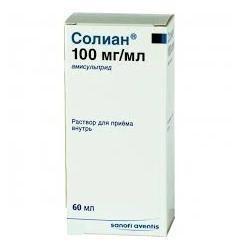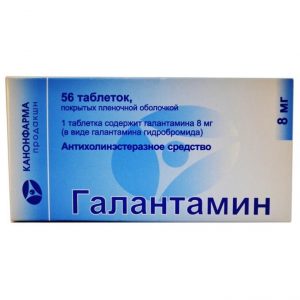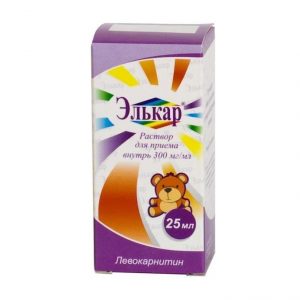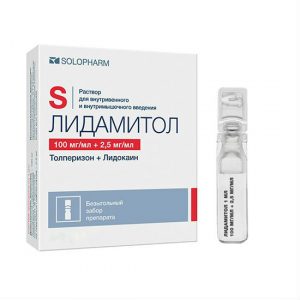Description
Packaging
Bottle 60 ml.
Pharmacological action
Solian is an antipsychotic drug (antipsychotic), has a neuroleptic, antipsychotic effect.
Amisulpride has a high selective affinity for the dopaminergic receptors of the D 2 / D 3 subtypes and does not have an affinity for the D 1, D 4 and D 5 subtypes.
Unlike classical and atypical antipsychotics, amisulpride has no affinity for serotonin receptors, histamine H 1 receptors, -adrenoreceptors and cholinergic receptors.
When used in high doses, it blocks postsynaptic D 2 receptors localized in limbic structures, unlike similar striatum receptors. It does not cause catalepsy and does not lead to the development of hypersensitivity to dopamine D 2 receptors after repeated treatment.
In low doses, it predominantly blocks presynaptic D 2 / D 3 receptors, stimulating the release of dopamine.
The atypical pharmacological profile determines the antipsychotic effect of amisulpride in high doses, resulting from blockade of postsynaptic dopamine receptors, and its effectiveness in low doses against negative symptoms as a result of blockade of presynaptic dopamine receptors.
Amisulpride to a lesser extent causes extrapyramidal side effects, which may be due to its predominant limbic activity.
In patients with acute schizophrenia, Solian acts both on secondary negative symptoms and on affective symptoms (i.e. including depressive mood and retardation).
Indications
Acute and chronic schizophrenia, accompanied by severe productive (including delusions, hallucinations, thinking disorders) and / or negative (including affective flatness, lack of emotionality and avoiding communication) disorders, including h in patients with a predominance of negative symptoms.
Contraindications
– Concomitant prolactin-dependent tumors (including pituitary prolactinoma, breast cancer).
– Pheochromocytoma.
– Severe renal failure (CC less than 10 ml / min).
– Combined use with suloprid.
– Combined use with dopaminergic agonists (including amantadine, apomorphine, bromocriptine, cabergoline, entacapone, lisuride, pergolide, pyribedil, pramipexole, quinagolide, ropinirole, selegiline), with the exception of patients with Parkins disease.
– Children under 14 years old.
– Lactation (breastfeeding).
– Hypersensitivity to amisulpride and other components of the drug.
Caution is advised to use the drug in: – Pregnancy.
– Epilepsy.
– Parkinsonism.
– Renal failure.
– In elderly patients.
Pregnancy and lactation
The safety of amisulpride during pregnancy has not been established. Consequently, the use of the drug during pregnancy is not recommended, unless the intended benefit to the mother justifies the potential risk to the fetus.
The use of amisulpride during lactation is contraindicated.
Special instructions
Perhaps the development of malignant antipsychotic syndrome, characterized by hyperthermia, muscle rigidity, dysfunction of the peripheral nervous system, elevated levels of CPK. With the development of hyperthermia, especially when used in high doses, all antipsychotic drugs (including Solian) should be discontinued.
Since amisulpride is excreted by the kidneys, in case of serious impaired renal function, the dose of the drug and the treatment regimen should be adjusted. There is no experience with the use of the drug in patients with severe impairment (CC less than 10 ml / min).
Since the drug is poorly metabolized, dose reduction is not required for impaired liver function.
Due to the possible reduction in the seizure threshold when using amisulpride, patients with a history of epilepsy need constant monitoring during therapy with Solian.
In elderly patients, amisulpride should be used with special precautions because of the possible risk of arterial hypotension or excessive sedation.
In Parkinson’s disease, caution is required when prescribing antidopaminergic drugs and amisulpride because of a possible worsening of the condition. Amisulpride should only be used if antipsychotic therapy cannot be avoided.
Amisulpride causes a dose-dependent prolongation of the QT interval, thereby increasing the risk of developing serious ventricular arrhythmias (such as pirouette). Before prescribing the drug, and, if possible, depending on the clinical condition of the patient, it is recommended to control factors contributing to the development of arrhythmia: bradycardia (heart rate less than 55 beats / min), hypokalemia, congenital lengthening of the QT interval.
In patients who require long-term treatment with antipsychotics, an ECG should be performed during the initial status assessment.
Due to the content of lactose in the tablets, the drug is contraindicated in congenital galactosemia, a syndrome of impaired glucose or galactose absorption, or in case of lactase deficiency.
Influence on the ability to drive vehicles and control mechanisms: Amisulpride affects the reaction rate, as a result of which the ability to engage in potentially hazardous activities can be impaired.
Composition
1 ml contains: amisulpride 100 mg
Dosage and administration of
In acute psychotic episodes, the recommended dose is 400 to 800 mg / day. In some cases, if necessary, the dose can be increased to 1200 mg / day. Doses are increased taking into account the individual tolerance of the drug. The maximum daily dose should not exceed 1200 mg.
In case of mixed negative and productive symptoms, the doses should be selected so as to provide optimal control over the productive symptoms: on average, from 400 mg to 800 mg / day Supportive treatment should be established individually at the minimum effective dose level.
Recommended daily dosage varies from 50 to 300 mg. Selection of doses should be individual.
Olian patients should be given special care with Solian because of the possible development of arterial hypotension or excessive sedation.
In doses exceeding 400 mg / day, Solian should be prescribed in 2 divided doses.
Side effects of the
From the central nervous system: Often – insomnia, anxiety, agitation, sometimes – extrapyramidal symptoms (including tremor, hypertension, hypersalivation, akathisia, hypokinesia), the intensity of which at maintenance doses is usually moderate, the symptoms are partially reversible without the withdrawal of Solian by anticholinergic antiparkinsonian drugs (the incidence of dose-dependent extrapyramidal symptoms remains very low in the treatment of patients with a predominance of negative symptoms at doses of 50-300 mg / day) rarely – daytime drowsiness is very rare – acute dystonia (including spastic torticollis, oculogyric crises, trismus), which is reversible and corrected with antiparkinsonian drugs with prolonged use – tardive dyskinesia, characterizing Being carried out by rhythmic, involuntary movements of the tongue and / or face mainly (antiparkinsonian drugs are ineffective and can cause worsening of symptoms) in isolated cases – malignant antipsychotic syndrome, convulsive seizures.
From the digestive system: Rarely – constipation, nausea, vomiting, dry mouth in some cases – an increase in the activity of liver enzymes (mainly transaminases).
From the endocrine system: Often – increased plasma prolactin levels (reversible after drug withdrawal), which can cause galactorrhea, amenorrhea, gynecomastia, breast swelling, impotence, frigidity, as well as weight gain.
From the cardiovascular system: Rarely – arterial hypotension, bradycardia, prolongation of the QT interval is very rare – atrial fibrillation.
Other: In some cases, allergic reactions.
Drug interactions
Combinations that are contraindicated: With dopaminergic agonists (including amantadine, apomorphine, bromocriptine, cabergoline, entacapone, lisuride, pergolide, pyribedil, pramipexole, quinolinol, sickinolide, quinolinol, sickinolide, quinrolide, sickinolide, . Dopaminergic agonists and antipsychotics exhibit mutual antagonism. With extrapyramidal syndrome caused by antipsychotics, anticholinergics should be used instead of dopaminergic agonists. With the simultaneous use of Solian with sultopride, the risk of ventricular arrhythmias, especially atrial fibrillation, is increased.
Combinations that are not recommended: With drugs that can cause arrhythmias such as pirouette: antiarrhythmic drugs of class Ia (including quinidine, hydroquinidine, disopyramide) and class III (including amiodarone, sotalol, dofetilide, ibutilide ), some antipsychotics (including thioridazine, chlorpromazine, levomepromazine, trifluoperazin, cyamemazine, sulpiride, tiapride, pimozide, haloperidol, droperidol) and other drugs (including bepridil, cisapride, diphemanil, iv misolastine, iv vincamine, halofantrine, sparfloxacin, gatiflox qing, moxifloxacin, pentamidine, iv spiramycin). The risk of ventricular arrhythmias increases, especially the development of arrhythmias such as pirouette. If the combination of drugs cannot be avoided, before the appointment, monitor the QT interval and begin monitoring the ECG. Ethanol enhances the sedative effects of antipsychotics. Avoid the consumption of alcohol and the use of medicines containing alcohol. Mutual antagonism of the action of levodopa and antipsychotics when prescribing these drugs should be taken into account. In patients with Parkinson’s disease, the minimum effective dose of both drugs is recommended.
Combinations requiring special care: With drugs that cause bradycardia (including beta-blockers / except sotalol / calcium channel blockers that cause bradycardia – diltiazem and verapamil), clonidine, guanfacin, digitalis preparations, and choline inhibitors. including donepezil, rivastigmine, tacrine, ambenonium, galantamine, pyridostigmine, neostigmine). With drugs that can cause hypokalemia (including potassium-excreting diuretics, laxatives, iv amphotericin B, glucocorticoids, tetracosactides). With the above combinations of drugs, there is a risk of ventricular arrhythmias, especially the development of arrhythmias such as pirouette.
Combinations to be taken into account: With antihypertensive agents and beta-blockers in heart failure (including bisoprolol, carvedilol, metoprolol) has a vasodilating effect, increasing the risk of orthostatic hypotension (additive effect). With morphine derivatives (including analgesics, antitussive drugs), barbiturates, benzodiazepines and other anxiolytics, hypnotics, sedative antidepressants (including amitriptyline, doxepin, mianserin, mirtazapine, trimipramine), sedative antihistamines central action antipsychotics and other drugs (including baclofen, thalidomide, pisotifen) leads to a pronounced increase in the inhibitory effect on the central nervous system (attention spans and danger to transport drivers and machine operators).
Overdose
There is limited experience with overdose of amisulpride.
Symptoms: increase in known pharmacological effects of the drug (including drowsiness, sedation, arterial hypotension, extrapyramidal symptoms, coma).
Treatment: with an acute overdose, it is necessary to study the possible combination with other drugs and take the necessary measures: careful monitoring of vital functions of the body monitor ECG monitoring (risk of QT prolongation) in case of serious extrapyramidal symptoms, anticholinergic agents should be prescribed. Hemodialysis is ineffective. There is no specific antidote for amisulpride.
Storage Conditions
The product should be stored in a dry place at temperatures below 25 ° C.
D ystvuyuschee substance
Amisulpride
Terms leave through pharmacies
In retseptu
Dosage form
oral solution
Sanofi-Aventis, France




